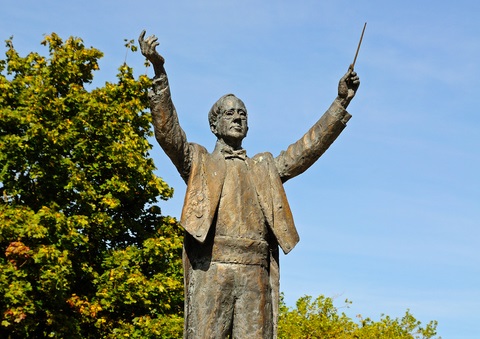Conference Review: Rethinking Gustav Holst, 18-19 Oct 2024, Utah State University/online
The Symposium “Rethinking Gustav Holst” was held on 18 and 19 October 2024 at Utah State University in Logan, Utah and via Zoom for speakers and participants unable to travel. This was convened by Dr. Christopher M. Scheer (Utah State University), and Rachel Gain (Yale University). There were over fifty registered participants for the event (from the United States, Europe, and Australia), and eleven speakers. Conceived as a moment of both celebration and reflection on the 150th anniversary of Holst’s birth, the symposium began with a powerful keynote address by Dr. Nalini Ghuman (Mills College at Northeastern University) on Friday night. In this she argued for a transnational approach to understanding Holst by not only considering his Sanskrit works but also his late engagement with Welsh choral traditions. Her address was a call for not only the reassessment of Holst, but a more general rethinking of the history of 20th-century British classical music beyond its traditional nationalist frames.
The next day included five paper sessions and roundtables covering the themes of Historiography, Mysticism and Philosophy, and New Paths for Holst Study. The quality of the presentations was extremely high, and the conversations in the roundtable discussions emphasized the need to not only critique the inherited historiography of Imogen Holst, but also to look outside the historiographies she created to find new relevance for her father and music. This was aptly demonstrated by papers by Rachel Gain, who explored the role of embodiment in Holst’s music for amateurs; Kathleen McGowan (University of Illinois) whose groundbreaking work on composer Jane Joseph helps to recontextualize Holst as a teacher and mentor; and Kirsten Barker (University of Illinois), whose ecomusicological reading of Egdon Heath suggests a compelling new way to find meaning in a traditionally gnomic work. It should not go unremarked as well that the noted Vaughan Williams scholar, Dr. David Manning presented a fascinating paper on Holst’s First Choral Symphony, his first foray into Holst studies. Dr. Manning passed away suddenly a couple weeks later, leaving his contributions to the Symposium one of the last acts of a thoughtful and impactful scholarly career.
The Symposium concluded on Saturday night with a gala concert by the American Festival Chorus and Orchestra conducted by Dr. Craig Jessop, former conductor of the Tabernacle Choir at Temple Square (formerly known as the Mormon Tabernacle Choir). This included a rare performance of Holst’s sublime Ode to Death as well as other choral works connected to the Whitsuntide Festivals organized by Holst and his associates, excerpts from the Suite for Large Orchestra “The Planets,” the Saint Paul’s Suite and what may have been the American Premiere of Jane Joseph’s Festival Venite. The concert was played to a full and enthusiastic audience.
In addition to the paper and roundtable sessions on Zoom, both the keynote and the concert were available streaming. As the former events were quite late for UK participants, all those registered were able to access these streaming for a period after the Symposium. The Zoom and streaming elements of the Symposium would not have been possible without the generous support of the Royal Musical Association, to which the organizers and participants extend a hearty expression of thanks.
Christopher M. Scheer is Associate Professor of Musicology at Utah State University.

